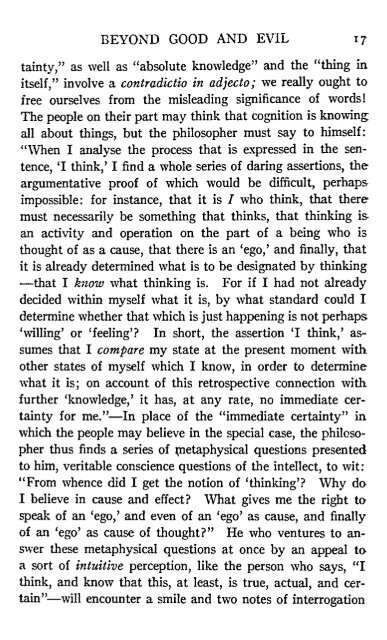Macmillan
1NB5fvA
1NB5fvA
You also want an ePaper? Increase the reach of your titles
YUMPU automatically turns print PDFs into web optimized ePapers that Google loves.
"<br />
that<br />
" will<br />
In<br />
BEYOND GOOD AND EVIL 17<br />
tainty,"as well as "absolute knowledge"and the "thingin<br />
itself," involve a contradictio in adjecto; we reallyought to<br />
free ourselves from the misleadingsignificance of words!<br />
The peopleon their part may think that cognition is knowing<br />
all about things,but the philosopher must say to himself:<br />
"When I analysethe process that is expressed in the sentence,<br />
'I think,' I find a whole series of daringassertions, the<br />
argumentativeproof of which would be difficult, perhaps<br />
impossible:for instancețhat it is / who think, that there<br />
must necessarily be somethingthat thinks țhat thinkingis<br />
an activityand operationon the part of a being who is<br />
thoughtof as a cause, that there is an 'ego,'and finally, that<br />
it is alreadydetermined what is to be designatedby thinking<br />
I know what thinkingis. For if I had not already<br />
decided within myselfwhat it is,by what standard could I<br />
determine whether that which isjusthappeningis not perhaps<br />
'willing' or 'feeling'?In short țhe assertion 'I think,'assumes<br />
that I compare my state at the presentmoment with<br />
other states of myselfwhich I know, in order to determine<br />
what it is;on accoimt of this retrospective connection<br />
with<br />
further 'knowledge,'it has,at any rate, no immediate certainty<br />
for me." "<br />
placeof the "immediate certainty"in<br />
which the peoplemay believe in the specialcase, the philosopher<br />
thus finds a series of ^netaphysical questionspresented<br />
to him,veritable conscience questionsof the intellect, to wit:<br />
"From whence did I get the notion of 'thinking'?Why do<br />
I believe in cause and effect? What givesme the rightto<br />
speak of an 'ego,'and even of an 'ego'as cause, and finally<br />
of an 'ego'as cause of thought?" He who ventures to answer<br />
these metaphysicalquestionsat once by an appealto<br />
a sort of intuitive perception, like the person who says, "I<br />
think,and know that this,at least,is true,actual,and certain"<br />
encounter a smile and two notes of interrogation




